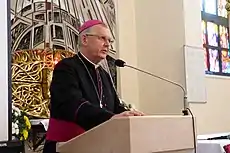Tomasz Peta
Tomasz Bernard Peta (Russian: Томаш Бернард Пэта; born on 20 August 1951 in Inowrocław, Poland) is the current Catholic Archbishop of the Metropolitan Archdiocese of Saint Mary in the city of Astana, and the President of the Bishops' Conference of Kazakhstan from May 19, 2003. He speaks Polish, Russian and Kazakh language and he is citizen of Kazakhstan.
His Excellency Tomasz Bernard Peta | |
|---|---|
| Archbishop of Maria Santissima in Astana | |
 | |
| Church | Catholic Church |
| Archdiocese | Mary Most Holy in Astana |
| Province | Kazakhstan |
| Appointed | 17 May 2003 |
| Orders | |
| Ordination | 5 June 1976 by Stefan Wyszyński |
| Consecration | 19 March 2001 by John Paul II |
| Rank | Metropolitan Archbishop |
| Personal details | |
| Born | 20 August 1951 Inowrocław, Poland |
| Nationality | Pole |
| Denomination | Catholic |
| Residence | Astana, Kazakhstan |
| Previous post | Apostolic Administrator of Astana (1999-2003) |
Priesthood
On 5 June 1976, he was ordained to the priesthood from the diocese of Gniezno. He began his work in Kazakhstan on 21 August 1990 as the parish of Mary - Queen of Peace in the village of Lakeside Tayynshinsky region of North Kazakhstan region. On 6 August 1999 Pope John Paul II appointed him Apostolic Administrator in Astana.[1] On 19 March 2001 by decision[2] of the Holy See, Peta was ordained bishop. On 17 May 2003 the Pope lifted[3] the Apostolic Administration in Astana to the level of archdiocese titled Archdiocese of Saint Mary in Astana. Then, on June 16, 2003, Tomasz Peta was appointed[4] Archbishop, Metropolitan Archdiocese of St. Mary in Astana. On 19 May 2003, he was elected President of the Conference of Bishops of Kazakhstan. On 1 April 2008 Pope Benedict XVI entered[5] the Metropolitan Tomasz Peta in the Congregation for the Clergy, dealing with life and work of the priests.
Declaration of Truths
On June 10, 2019, Peta, along with cardinals Raymond Leo Burke and Jānis Pujats, in addition to Astana Auxiliary Bishop Athanasius Schneider and fellow Kazach archbishop Jan Paul Lenga, published a 40-point "Declaration of Truths" claiming to reaffirm traditional Church teaching. The bishops wrote that such a declaration was necessary in a time of "almost universal doctrinal confusion and disorientation." Specific passages in the declaration implicitly relate to several writings by Pope Francis. The declaration states that "the religion born of faith in Jesus Christ" is the "only religion positively willed by God," seemingly alluding to a document signed by Pope Francis on February 4 called "Human Fraternity" which stated that the "diversity of religions" is "willed by God." Following recent changes to the Catechism to oppose capital punishment, the declaration states that the Church "did not err" in teaching that civil authorities may "lawfully exercise capital punishment" when it is "truly necessary" and to preserve the "just order of societies."[6]
References
- "91 Acta Apostolicae Sedis 1030 (1999)" (PDF). The Holy See. 1999. Retrieved June 29, 2018.
- "93 Acta Apostolicae Sedis 334 (2001)" (PDF). The Holy See. 2001. Retrieved June 29, 2018.
- "95 Acta Apostolicae Sedis 569" (PDF). The Holy See. September 8, 2003. Retrieved June 29, 2018.
- "95 Acta Apostolicae Sedis 641" (PDF). The Holy See. September 8, 2003. Retrieved June 29, 2003.
- "100 Acta Apostolicae Sedis 263 (2008)" (PDF). The Holy See. April 4, 2008. Retrieved June 29, 2018.
- Pentin, Edward (June 10, 2019). "New 'Declaration of Truths' Affirms Key Church Teachings". June 20, 2019. Retrieved June 20, 2019.